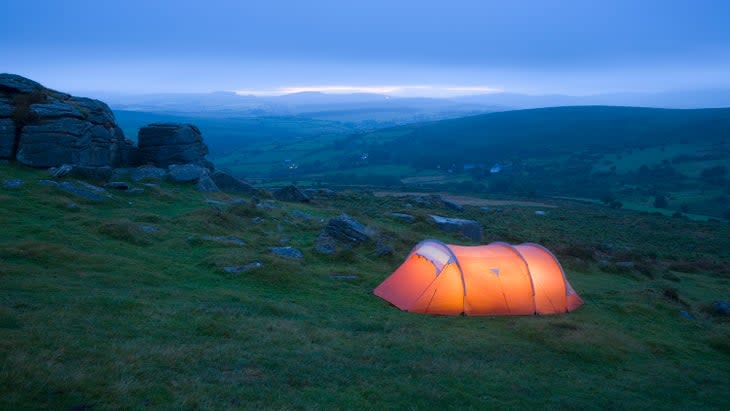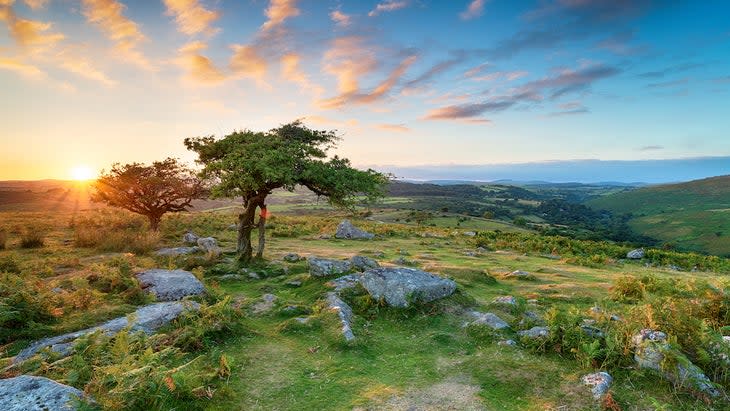A Landmark Case in England Could Spell Disaster for Backpackers
This article originally appeared on Backpacker
A court ruling that effectively struck down the right to backpack in England last week sent national park authorities in that country scrambling to come to a deal with landowners--and reignited a debate about who, if anyone, should be allowed to set limits on hikers' "right to roam."
Unlike in many countries, national parks in the United Kingdom are not public lands. Instead, they're predominantly made up of a patchwork of private estates and often include towns and farms within their borders. In Scotland, a 2003 law codified hikers’ traditional right to access most uncultivated land, regardless of who owns it; in England and Wales, however, the situation is very different. A 2000 law and established paths mostly guarantee dayhikers' access, but in the vast majority of national parks, spending the night outside of established campgrounds without landowner permission is prohibited. The exception was Dartmoor National Park, an expanse of rolling green moors, remnant forest, and stone-capped tors in England's far southwest. There, under a 1985 law, backpackers have enjoyed an assumed right to wild camp in uncultivated areas based on historic custom.
In December, however, landowner and hedge fund manager Alexander Darwall filed a lawsuit arguing that the law did not protect the right to wild camp. On January 13, England's High Court agreed, ruling that campers needed landowners' permission for overnight stays in Dartmoor as well. The presiding judge, Sir Julian Flaux, said that there was "no local custom of camping which has the force of law."

Since 2013, Darwall and his wife, Diana, have owned the park's 4,000-acre Blachford Estate, where they raise cows, sheep, and deer and host pheasant and deer hunters. The pair are the park's sixth-largest landowners; the Duchy of Cornwall, currently occupied by Prince William, is the largest, owning nearly a third of the park.
On the Blachford Estate's Facebook page, a reshared newspaper column post questioning livestock's role in climate change shared space with a statement thanking the High Court for its "thoroughness" and professing a desire to work together with park authorities to "improve conservation of the Dartmoor Commons and improve the experience for those enjoying the Commons legitimately."
"Our intention was not to ban camping on Dartmoor, but to clarify the law on this matter," the Darwalls wrote. "We have always wanted to work with the Dartmoor National Park Authority on this issue, and the recent Court ruling now affords us that opportunity. We are hoping to come to a mutually satisfactory arrangement in the near future."
Local hikers, guides, and educators, in contrast, have called the court's ruling nothing less than an existential threat to wild camping in England. Previously, wild campers in Dartmoor just had to follow a set of simple rules: no fires or grills, maximum two-night stay, leave no trace. Thousands of people took advantage of it, including teenagers who hiked up to 55 miles to tag the park's most prominent summits as part of the annual Ten Tors Challenge. Now, landowners have full discretion about whether or not to allow campers.
In an email, Kelly Rich, a spokesperson for the Dartmoor Preservation Association, wrote that wild camping on Dartmoor was "a deeply entrenched part of many peoples' personal histories" and called the Darwall's stated concern about conservation "a pretext."
"We were extremely disappointed by the Court's ruling," Rich wrote. "We believed (and still do) that the park authority has a strong case for maintaining the right to wild camp on Dartmoor. We and many others are committed to supporting them in an appeal. Sadly, in the end, we were not surprised, a single wealthy landowner has won a temporary victory against access."

It seems almost certain that wild camping in the park will continue in some form, at least temporarily. On Thursday, park authorities announced that they had reached a 12-month deal with most Dartmoor landowners to allow camping access to their land in exchange for an unspecified payment.
Not all outdoor advocates are impressed with the deal, however. In an interview with the BBC, Guy Shrubsole, from the pro-access group Right to Roam, called the agreement a "ransom note" from landowners.
“The public have just had their right to wild camp summarily snatched from them by a wealthy landowner," said Shrubsole. "Now we’re expected to be grateful to landowners who grant us permission to wild camp, and pay for the privilege."
The court's decision garnered a variety of reactions from legislators representing nearby communities. Anthony Mangnall, a member of the Conservative Party representing Totnes who, according to the Guardian, accepted a $5,000 donation from the Darwalls in 2020, refused to comment on the decision, telling constituents that he felt it was inappropriate for a member of parliament to speak about ongoing legislation.
In contrast, Luke Pollard, a member of the Labour Party representing Plymouth Sutton and Devonport, wrote in an email that he and his party had "committed to extend the right to roam in England as part of our programme for government," and noted Dartmoor's historic importance to his constituents.
"Dartmoor is our historic green lung for Devon," Pollard wrote. "Its brutal natural beauty, wildlife, and moody weather makes Dartmoor unique among Britain's national parks. Plymouth sits between the sea and the Moor and both have shaped my city's development and history."
The Dartmoor National Park Authority is reportedly still considering whether to appeal the court's decision.
For exclusive access to all of our fitness, gear, adventure, and travel stories, plus discounts on trips, events, and gear, sign up for Outside+ today.

